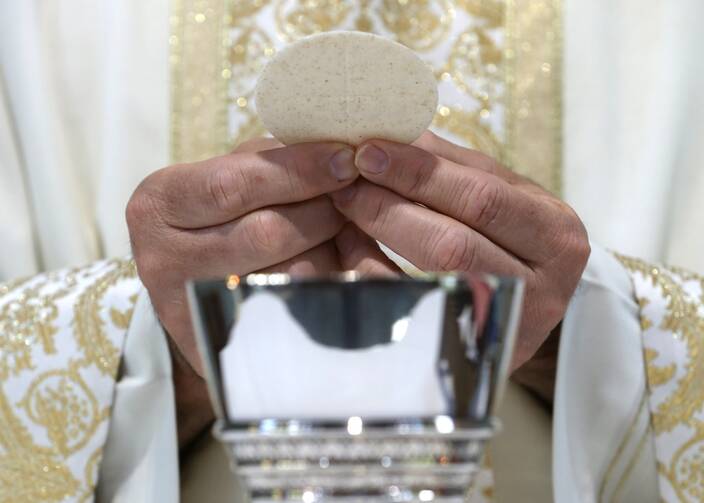The bishops are right: We need a national eucharistic revival. But the current plan isn’t enough.
Do we need a national eucharistic revival?
We do—and for several reasons. Studies have recently shown that large numbers of Catholics do not understand the Eucharist, especially as the real sacramental presence of the Lord in his church. At a practical level, the numbers of those who regularly participate in the Sunday Eucharist continue to diminish. In fact, those who do participate weekly form a distinct minority of perhaps 20 percent of U.S. Catholics, and they are largely an older and vanishing generation of believers.
There are pockets of young Catholics frequenting Mass, and those celebrations can be vibrant and sustaining. But younger Catholics overall are not to be found in church each Sunday. The Covid-19 pandemic has also had an impact on eucharistic practice. Many of those who rightly stayed away from Mass because of health concerns have yet to return, even with a much-diminished risk of contagion. Finally, there is a small but vocal minority of those who want the traditional Latin Mass instead of the renewed and restored liturgy of the Second Vatican Council. With all this in play, we certainly need a national eucharistic revival or—perhaps more accurately—a national eucharistic reset.
Our engagement in the liturgical action of the Eucharist is not as spectators or passive recipients or even as half-aware and distracted participants. It is to be full, conscious and active.
However, after reviewing materials associated with the National Eucharistic Revival, I am not confident that it will accomplish what it sets out to do. The heavy emphasis that it places on eucharistic devotions, such as processions, adoration, Forty Hours and eucharistic miracles—as praiseworthy as these might be in themselves—does not capture the heart of the matter. The real challenge is not to understand, appreciate and reverence the Eucharist as a sacramental object, which can be a real tendency of eucharistic devotions. No, the real challenge is to enter together the mystery of the Lord’s self-sacrificing love made present and communicated in the eucharistic action—take, eat, drink, do, remember. To enter that mystery is to find ourselves individually and collectively transformed into the very one we celebrate, Jesus who is present among us as our hope of glory.
Eucharistic devotions cannot be ends in themselves. The history of Christian spirituality instructs us that all devotions—whatever their form—are always relative to another, higher dimension of faith. The shape of devotional life can depend on a particular culture, a specific historical moment or even personal temperament. All that said, eucharistic devotions can serve a good purpose for many, if not all, people. They can lead us to the eucharistic action, and they can lead from it and, in a certain sense, prolong it. In neither case, however, can they substitute for the eucharistic action itself or claim an absolute value in Christian life.
Now consider what it takes to enter together the mystery of the Lord’s self-sacrificing love in the Eucharist. That entrance or engagement in the liturgical celebration of the mystery is another way of speaking about our participation in the Eucharist as the Second Vatican Council described it: “Mother Church earnestly desires that all the faithful should be led to that full, conscious, and active participation in liturgical celebrations which is demanded by the very nature of the liturgy” (“Constitution on the Sacred Liturgy,” No. 14).
Our engagement in the liturgical action of the Eucharist is meant to be full, conscious and active participation. Obviously, then, our engagement is not as spectators or passive recipients or even as half-aware and distracted participants. No, it is to be full, conscious and active. The challenge is to understand and know exactly what this means practically. In my mind, the real possibility of a eucharistic revival hinges precisely on reclaiming our participation in the Eucharist.
The history of Christian spirituality instructs us that all devotions—whatever their form—are always relative to another, higher dimension of faith.
In some quarters, “active participation” correlates with having a job to do in the liturgy. This means that the truly active participants are those who preside, read, lead music, serve at the altar or assist with the distribution of holy Communion. The rest of the congregation participates, of course, but in a much more muted way. In fact, this sense of active participation misses the true sense of engagement to which the Eucharist summons us. Certainly, participation involves an external and visible dimension, the sensory actions of making responses, singing and changing posture. The council, however, describes participation in a wider way in the “Constitution on the Sacred Liturgy.” It is both internal and external (No. 19).
At this point, when we recognize the summons to internal participation, we touch on the foundational task for a eucharistic revival. Through their baptism, the priestly people of God are joined to the death and resurrection of the Lord. In fact, Jesus instituted the Eucharist as a means of bringing disciples of all ages to the cross. In the eucharistic celebration, we take on to ourselves his heart and soul as he lovingly offers himself to the Father for the sake of his sisters and brothers, who need to be freed from the bonds of sin and death. He dies and rises so that they may live.
Each time we celebrate the Eucharist, the stakes are high. With our world and our human family, we struggle before the enigma of sin constituted by both our personal failures and the world’s brokenness. We struggle before the enigma of death that seems to signal our extinction and the utter futility of our lives. When we participate in the Eucharist, when we engage and join the mystery of the one who dies and rises and is victor over sin and death, we worship with him in spirit and in truth and join in his victory.


No comments:
Post a Comment